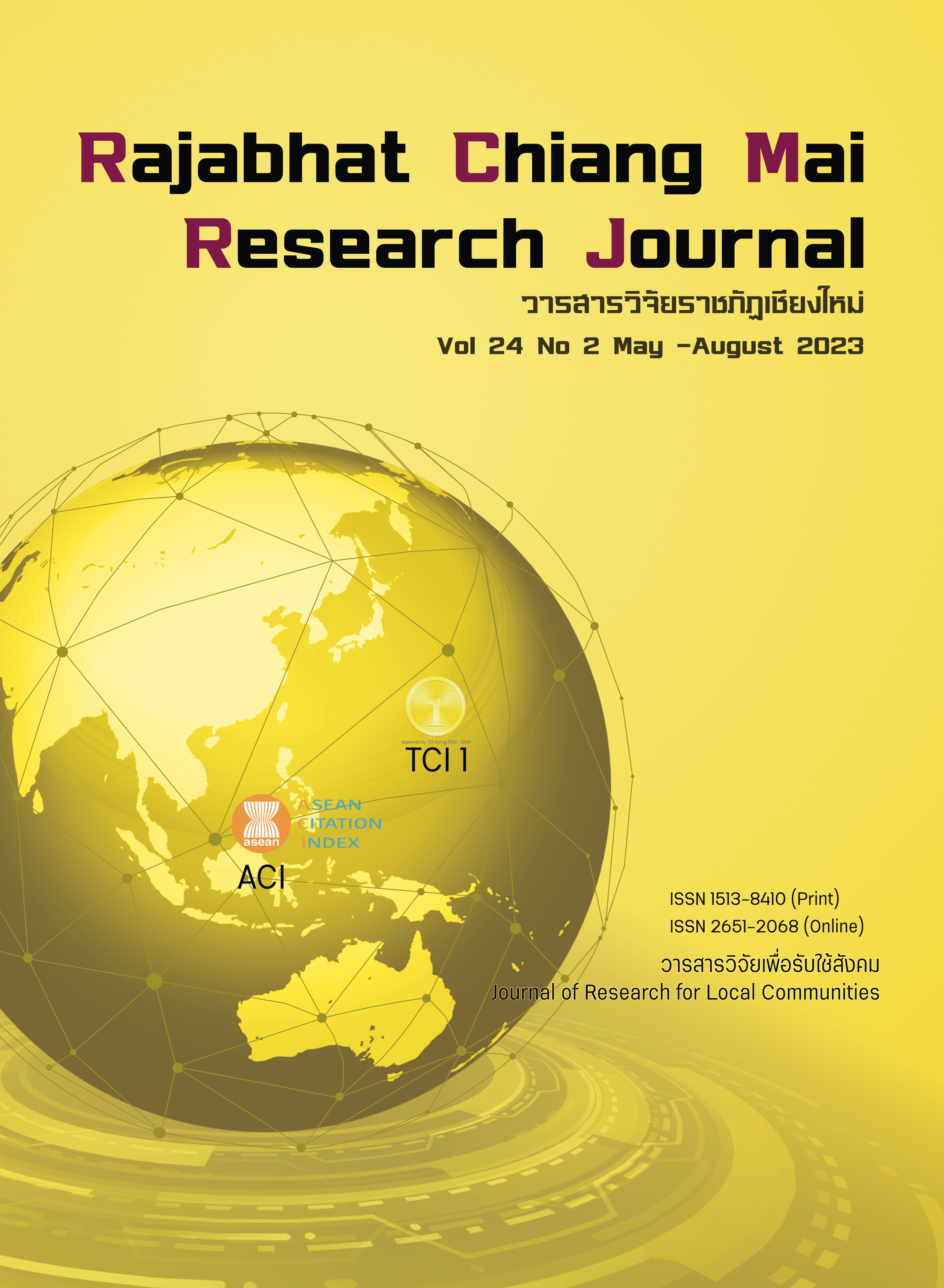Enhancement of Study Skills for the Subject Career 3 (3D Drawing) for Mathayomsuksa 2 Students using the Canva Application
DOI:
https://doi.org/10.57260/rcmrj.2023.263909คำสำคัญ:
Canva application, 3D drawing, Enhancing study skillsบทคัดย่อ
The objectives of this research were (1) to enhance study skills for the subject career 3 (3D Drawing) for Mathayomsuksa 2 students, (2) to develop teaching materials using the Canva application, and (3) to study the satisfaction of students in studying the subject career 3 (3D Drawing). The samples used in the research were grade 2/10 students, semester 1, academic year 2022, Sanpatong Wittayakhom School, Sanpatong District, Chiang Mai Province, total 36 people. Research tools included the Canva application, skill building guides, video clips of 3D drawing using the Canva application, and lesson plans. However, data analysis uses statistics of percentage, mean and standard deviation. The results of the study found that the enhancement of learning skills was at a high level = 4.43, the development of instructional materials using Canvas Image application was at a high level = 4.48, and overall student satisfaction was at a high level = 4.47. While educating students utilizing innovative teaching medium and analyzing student behavior in class, it was discovered that students paid attention and participated in class activities quite well.
Downloads
เอกสารอ้างอิง
Bamrungjit, C. (2013). The development of e-learning system lesson materials for the subject of mechanic and craft 1 (drawing 1) Matthayomsuksa 1. Mahasarakham: Mahasarakham University. (In Thai)
Boonsue, W. (2018). Integrating research with teaching and learning. Chiang Mai: under the jurisdiction of the Chiang Mai Primary Educational Service Area Office Region 1. (In Thai)
Chaiyarat, P. (2010). Craftsmanship 4-6. Bangkok: Emphan Publishing Company Limited. (In Thai)
Chanput, S. (2018). The Effects of Blended Training Via Using Cloud Computing to Students' Infographic Design Ability Faculty of Education, Silpakorn University. Department of Educational Technology Faculty of Silpakorn University. (In Thai)
Chiraphan, U. (2013). Curriculum in Design and Technology. Bangkok: Institute for the Promotion of Science and Technology Teaching. (In Thai)
Department of Academic Affairs. (2008). Organizing learning content according to the basic education core curriculum. Bangkok: Department of Academic Affairs, Ministry of Education. (In Thai)
Diggelen, V.M. (2021). Definition of Gamification. New York: Holt Rinchart and Winston.
Srisaard, B. (2010). Statistical Methods for Research Volume 1 (5th edition). Bangkok: Suweeriyasan. (In Thai)
Suetrong, A. (2010). Industrial Craftsman Materials. Bangkok: Publishing Center for Academic Promotion. (In Thai)
Tairuakham, S. (2009). Research Methods for Humanities and Social Sciences. Kalasin: Coordination of Printing. (In Thai)
ดาวน์โหลด
เผยแพร่แล้ว
รูปแบบการอ้างอิง
ฉบับ
ประเภทบทความ
สัญญาอนุญาต
ลิขสิทธิ์ (c) 2023 วารสารวิจัยราชภัฏเชียงใหม่

อนุญาตภายใต้เงื่อนไข Creative Commons Attribution-NonCommercial-NoDerivatives 4.0 International License.
1. บทความ ข้อมูล เนื้อหา รูปภาพ ฯลฯ ที่ได้รับการตีพิมพ์ใน “Community and Social Development Journal” ถือเป็นลิขสิทธิ์ของ Community and Social Development Journal มหาวิทยาลัยราชภัฏเชียงใหม่ และเพื่อให้เผยแพร่บทความได้อย่างเหมาะสมผ่านสื่อสิ่งพิมพ์และอิเล็กทรอนิกส์ ผู้เขียนยังคงถือครองลิขสิทธิ์บทความที่ตีพิมพ์ภายใต้ใบอนุญาต Creative Commons Attribution (CC BY) ซึ่งอนุญาตให้เผยแพร่บทความซ้ำในแหล่งอื่นได้ โดยอ้างอิงต้องอ้งอิงบทความในวารสาร ผู้เขียนต้องรับผิดชอบในการขออนุญาตผลิตซ้ำเนื้อหาที่มีลิขสิทธิ์จากแหล่งอื่น
2. เนื้อหาบทความที่ปรากฏในวารสารเป็นความรับผิดชอบของผู้เขียนบทความโดยตรง ซึ่งกองบรรณาธิการวารสารไม่จำเป็นต้องเห็นด้วยหรือร่วมรับผิดชอบใดๆ














